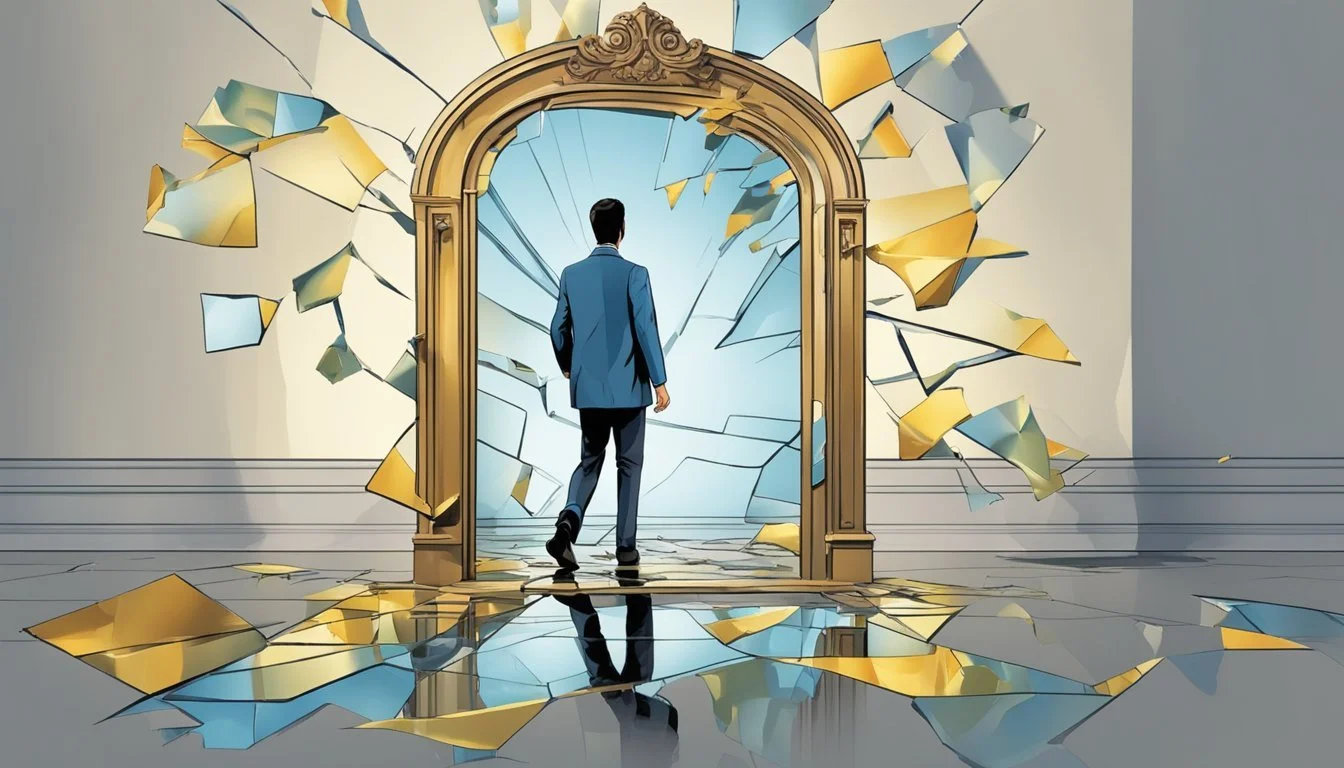Why a Narcissist Unfollowed Me: Understanding the Emotional Manipulation
Being unfollowed by a narcissist on social media can trigger feelings of rejection and sadness. This action often serves as a form of emotional manipulation, designed to create confusion and maintain control over their former partner or victim. A narcissist unfollowing someone is typically a calculated move to provoke a reaction, rather than a genuine desire for separation.
Narcissists frequently use social media as a tool for manipulation and maintaining their public image. When they unfollow someone, it may be an attempt to create the illusion of moving on or to punish the person for perceived slights. This behavior aligns with their tendency to discard people when they no longer serve a purpose or provide narcissistic supply.
Understanding the motivations behind a narcissist's actions can help individuals cope with the emotional impact of being unfollowed. It's important to recognize that this behavior reflects the narcissist's own insecurities and need for control, rather than any shortcoming of the person being unfollowed. Focusing on personal growth and healing, rather than the narcissist's social media activity, is crucial for moving forward.
Understanding Narcissism
Narcissism is a complex personality trait characterized by an inflated sense of self-importance and a deep need for excessive attention and admiration. It can significantly impact relationships and social interactions.
Traits of a Narcissist
Narcissists often display grandiosity, believing they are superior to others. They frequently exaggerate their achievements and talents, expecting to be recognized as exceptional without commensurate accomplishments.
Narcissists have an intense craving for admiration and attention. They may dominate conversations, steering topics back to themselves.
Lack of empathy is another hallmark trait. Narcissists struggle to recognize or identify with the feelings and needs of others.
They often have a sense of entitlement, expecting special treatment and unquestioning compliance with their wishes.
Narcissists can be manipulative, exploiting others to achieve their own ends. They may react with rage or contempt to perceived slights or criticism.
Narcissism in Relationships
In relationships, narcissists often seek partners who admire and validate them. They may initially appear charming and attentive, but this behavior is typically self-serving.
As the relationship progresses, narcissists may become controlling and emotionally abusive. They often use tactics like gaslighting to maintain power and control.
Narcissists struggle with emotional intimacy and may withdraw affection as a form of punishment. They frequently blame their partners for relationship problems, refusing to take responsibility.
Partners of narcissists often feel neglected and unimportant. The relationship typically revolves around the narcissist's needs and desires, leaving little room for reciprocity.
The Impact of Unfollowing on Social Media
Being unfollowed on social media can have significant psychological and social effects. It often triggers feelings of rejection and alters relationship dynamics in the digital age.
Emotional Consequences of Being Unfollowed
When someone unfollows us on social media, it can spark a range of emotions. Many experience feelings of rejection, hurt, and confusion. These reactions stem from our innate desire for social connection and acceptance.
For some, being unfollowed may trigger anxiety or self-doubt. They might question their self-worth or wonder what they did wrong. This can lead to obsessive checking of follower counts and overanalyzing past interactions.
Others may feel anger or resentment towards the person who unfollowed them. This is especially true if the unfollow comes from a close friend or romantic partner. Such actions can strain real-life relationships and create tension.
Social Media's Role in Modern Relationships
Social media has become deeply intertwined with how we form and maintain relationships. Followers and likes often serve as social currency, influencing our perceptions of popularity and connection.
When someone unfollows us, it can feel like a public rejection. This is particularly impactful in romantic relationships, where an unfollow might signal a breakup or distancing. It can also affect friendships, causing people to reassess the strength of their bonds.
Social media interactions sometimes replace face-to-face communication. This shift can make unfollowing feel more significant than it might be in reality. It's important to remember that online actions don't always reflect true feelings or intentions in the offline world.
Navigating the Aftermath of a Breakup with a Narcissist
Breaking up with a narcissist can be a challenging and emotionally draining experience. The process often involves unique obstacles and requires specific strategies for healing and moving forward.
The Breakup Process
Ending a relationship with a narcissist typically involves intense emotions and manipulation tactics. The narcissist may attempt to guilt-trip their partner or make false promises to maintain control.
Setting firm boundaries is crucial during this time. Clear communication about the decision to end the relationship helps prevent misunderstandings or false hopes.
Narcissists often react with anger or try to damage their ex-partner's reputation. Preparing for potential backlash and seeking support from trusted friends or family can provide essential emotional protection.
It's common for narcissists to attempt reconciliation through love bombing or grand gestures. Recognizing these behaviors as manipulation rather than genuine change is vital for maintaining the breakup.
Moving On after the Relationship Ends
Healing from a relationship with a narcissist requires time and self-care. Acknowledging the emotional impact of the relationship is an important first step.
Seeking professional help, such as therapy, can aid in processing complex emotions and rebuilding self-esteem. Therapists experienced in narcissistic abuse can provide valuable insights and coping strategies.
Rebuilding a support network is crucial, as narcissists often isolate their partners. Reconnecting with friends and family or joining support groups can provide comfort and understanding.
Practicing self-compassion helps counter the negative self-talk often internalized during the relationship. Focusing on personal growth and rediscovering individual interests aids in moving forward.
Establishing a no-contact policy can prevent further emotional manipulation and allow space for healing. Blocking the narcissist on social media and avoiding mutual acquaintances may be necessary steps.
Strategies for Healing and Growth
Healing after a narcissist unfollows you requires intentional self-care and resilience-building. These strategies can help you recover your sense of self and move forward in a healthy way.
Self-Care After Rejection
Focus on activities that nurture your physical and emotional well-being. Exercise regularly to boost endorphins and reduce stress. Practice mindfulness or meditation to calm anxious thoughts. Prioritize sleep and maintain a consistent sleep schedule.
Engage in hobbies or creative pursuits you enjoy. This helps rebuild confidence and rediscover your passions. Spend time in nature, which can have a restorative effect on mental health.
Seek support from trusted friends and family. Share your feelings and experiences with those who validate and encourage you. Consider joining a support group for survivors of narcissistic abuse.
Limit social media use to avoid potential reminders or comparisons. Instead, use that time for self-reflection or journaling to process your emotions.
Building Resilience
Set clear boundaries to protect yourself from further manipulation. This may include blocking the narcissist on all platforms and avoiding mutual locations.
Challenge negative self-talk and beliefs instilled by the narcissist. Replace them with positive affirmations and realistic self-assessments. Recognize your strengths and accomplishments.
Develop a growth mindset. View challenges as opportunities for learning and personal development. Set small, achievable goals to build confidence and momentum.
Practice self-compassion. Treat yourself with the same kindness you would offer a friend going through a difficult time. Acknowledge that healing is a process and be patient with yourself.
Explore new interests or skills. This expands your sense of identity beyond the relationship with the narcissist. It also creates opportunities for new social connections.
Understanding Online Interactions
Social media interactions can provide insights into relationships and personal dynamics. Unfollowing and blocking behaviors often reflect underlying psychological needs and boundaries.
The Psychology Behind Unfollowing and Blocking
Narcissists may unfollow or block others as a form of control or punishment. This action can stem from a perceived slight or a desire to manipulate emotions. For them, social media serves as a stage for attention and admiration.
When denied this, they might react by cutting off contact. This behavior aligns with their need for power and validation. Unfollowing can be a passive-aggressive tactic to provoke a response.
Blocking represents a more decisive action. It may occur when a narcissist feels threatened or exposed. They aim to protect their curated online image and maintain control over their narrative.
Creating Healthy Social Media Boundaries
Establishing clear boundaries on social media is crucial for mental well-being. Users should carefully consider their connections and content consumption. Limiting exposure to toxic individuals, including narcissists, is essential.
Privacy settings can help control who views and interacts with personal content. Regular "friend list" audits can ensure connections remain meaningful and positive. It's important to recognize that unfollowing or blocking is sometimes necessary for self-care.
Engaging mindfully on platforms reduces vulnerability to manipulation. Users should focus on authentic interactions rather than seeking validation. Balancing online presence with offline activities promotes a healthier perspective.
Moving Forward Without Closure
Healing after a narcissist unfollows you can be challenging, especially without closure. However, it's possible to move forward and reclaim your life.
Self-reflection is a crucial step in the healing process. Take time to examine the relationship objectively, recognizing both positive and negative aspects.
Establishing firm boundaries is essential. Block the narcissist on all social media platforms and avoid checking their profiles. This helps create emotional distance.
Focus on self-care and personal growth. Engage in activities that bring joy and fulfillment, such as hobbies, exercise, or spending time with supportive friends and family.
Seeking professional help can provide valuable guidance. A therapist experienced in narcissistic abuse recovery can offer tools and strategies for healing.
Practice mindfulness and grounding techniques to manage difficult emotions. Deep breathing exercises and meditation can help reduce anxiety and promote inner peace.
Remember that closure comes from within. Acceptance of the situation, rather than external validation, is key to moving forward.
Reconnect with your authentic self. Rediscover interests and passions that may have been neglected during the relationship.
Be patient with the healing process. Recovery takes time, and it's normal to experience setbacks. Celebrate small victories along the way.




